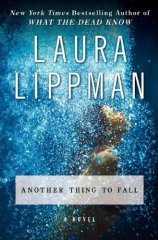



August 2026
Kill Your Darlings -- Or At Least Consider Giving Them Away
I think I first encountered "kill your darlings" in that precise coinage in Stephen King's (excellent) On Writing. But I had been given similar advice years ago. The writer Oakley Hall, who -- sadly -- I knew then only as the author of Downhill Racer, visited my creative writing class at Northwestern. I was the student "rewarded" with his personal critique. I remember two things about that afternoon: 1) my class nemesis, who was very begrudging of anyone's praise or good fortune, almost bounced in his seat with pleasure as my short story was dissected and 2) Hall was very firm that I must lose my favorite line of writing in the story, something about memory's careless hands. Or was it feet? In short: Good call, Mr. Hall.
Self-editing is, according to no less an expert than Michael Kors on the current season of Project Runway, part of the creative package. You have to know what to leave out. This past month, as I packed up my kitchen in advance of a renovation that friends have cheerfully advised me will wreck my sanity, I turned a ruthless eye toward my possessions. And I got a little... frenzied.
Now I love stuff. I also love to get rid of stuff. In fact, I love the latter so much that I consult with the pack rat in my life before I throw anything away. Between our two extremes lies some kind of normalcy.
Take my grandmother's china. I considered taking it to a consignment shop because I have used it only once or twice in the past six years. But the pack rat pointed out that it was really quite lovely. Besides, he said, are you so beyond sentiment that you would jettison your grandmother's china? (In a word: Yes. My grandmother died a few years back.) But I reconsidered. I always think of it as "Christmas china," but it's not quite that. The china is cream-colored with a lovely border of green leaves and gold. A quick Internet search revealed this was Franciscan's "Arcadia Green," first introduced in 1941. I did a little math. My father's family spent most of the Depression living in his grandmother's house, moving to Atlanta around the time of World War II. This china, possibly, was one of my grandmother's first prosperity purchases, if you will, a sign that the hard times were over. I felt sheepish that I had almost parted with them.Yet, sometimes there are items that we love so much that we must part with them. I feel that way about one of my prize items of Baltimore-bilia, a black-eyed Susan porcelain flask made by Jim Beam in honor of the 100th running of the Preakness. I adore it and yet... I have two good friends, a married couple, who took me to my first Preakness. They, in turn, met at the Kentucky Derby. Every year at Preakness time, they line up their commemorative Preakness glasses on their mantle. They are more worthy of this flask than I am. And they lately had some really good news. I must give them the flask. I don't want to. But, by the time you read this, I will have. Because that's another way of killing your darlings, and it's worth doing every now and then.
Now, back to figuring out why I own eleven ceramic bowls. (The one stainless steel one went to the neighborhood animal shelter, along with a dozen old towels. Click here if you want to know what other items that the shelter can use.)
Obligatory Publishing News
What the Dead Know won the first-ever Strand Critics' Award for best novel, lost the CWA Daggerto Frances Fyfields's Blood From Stone, while my short story, "One True Love," was left in the dust by Martin Edwards' "The Bookbinder's Apprentice." This all transpired in less than twenty-four hours on two different continents.
Check here next month for a Baltimore eating guide tied to Bouchercon.

